Fahrenheit 451 made a big impression on me right from the start and I want to share more than a regular book review. The book is intriguing, engaging, and complex. And I have a ton of thoughts on it.
This post is loosely inspired by Caitlyn’s Annotate With Me post. I really liked how she shared her annotation process, pieces of her annotations, and her thoughts on the book. Although I love annotating books—and even shared a guide to annotating for fun—I’ve never shared my annotations in this way.
For this book review post, I’m taking inspiration from her post by sharing my annotations and annotation process and discussing themes from the book beyond a regular review. So, get your favourite drink and settle down.
about Fahrenheit 451
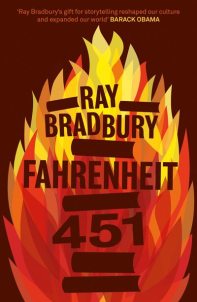
Sixty years after its original publication, Ray Bradbury’s internationally acclaimed novel Fahrenheit 451 stands as a classic of world literature set in a bleak, dystopian future. Today its message has grown more relevant than ever before.
Guy Montag is a fireman. His job is to destroy the most illegal of commodities, the printed book, along with the houses in which they are hidden. Montag never questions the destruction and ruin his actions produce, returning each day to his bland life and wife, Mildred, who spends all day with her television “family.” But when he meets an eccentric young neighbor, Clarisse, who introduces him to a past where people didn’t live in fear and to a present where one sees the world through the ideas in books instead of the mindless chatter of television, Montag begins to question everything he has ever known.
Content Warnings: brainwashing, violence, suicide, murder, war, injury, oppressive government.
my review & more
Fahrenheit 451 was never a big spot on my radar but someone I follow spoke highly about it a few weeks back which made me intrigued. On my next bookstore visit, I passed by the book and impulsively picked it up.
Somehow, I’m a little more open to trying new books—especially ones out of my comfort zone—when I come across them in the bookstore. Surprisingly, I picked this book up mere weeks after buying it instead of procrastinating for months (or years) like I generally do.
The book is a popular classic. My copy is blurbed by Barack Obama and has a special foreword and afterword by the author where he talks about how the book came to be and what it has led to.
Whenever I pick up a new book, I make some flexible decisions about annotation based on my expectation of the book, my mood, and whether I want to unhaul the book soon.
For Fahrenheit 451, I decided that I would use only sticky tabs. I planned on selling the book back to the second-hand bookstore I frequent so I didn’t want to make permanent marks.
I also chose a set of sticky tabs that matched the book cover in some way. Aesthetics matter, haha. I didn’t choose exactly which colours I would use. I tend to choose the set first and decide on the exact colours based on what I wanted to highlight while reading.
My first tab was on page 2 itself. It was in the author’s special foreword for the book’s fiftieth anniversary. He spoke about how he wrote the book in 9 days, the circumstances them, and how a bunch of his previous short stories came together in this story.
He also gave an insight into his writing process—how he often doesn’t know what he’s writing until he is actually writing.
The grand thing is to plunge ahead and see what your passion can reveal.
I’ve been reading a bunch of books about creativity this year so when I find any good line about it in any book, I highlight it. I want to pull all of these pieces together into a quotes dump one day so that I can simply read them when I need motivation. The above quote is definitely going into the dump.
After learning that the story was first written in about 9 days in a feverish haze, I was super intrigued to get into it. Once I started reading the story, I was hooked on it immediately. It was really easy to understand the setting and the main character’s thoughts.
It is almost as if the main character was made to be very simple in the beginning so that readers don’t have a hard time grasping the world-building and the main character’s position in that world. It takes a while to explain the entire set up but we are also kept engaged so we don’t feel confused or bored.
My next annotation was on page 18 when I came across a profound line. I was so absorbed in the story and gripped by the words that I picked the wrong coloured sticky tab. It wasn’t the same as the one I used before. But I couldn’t bring myself to care much so I decided to go with the vibes and use whatever colours without attaching a meaning to them.
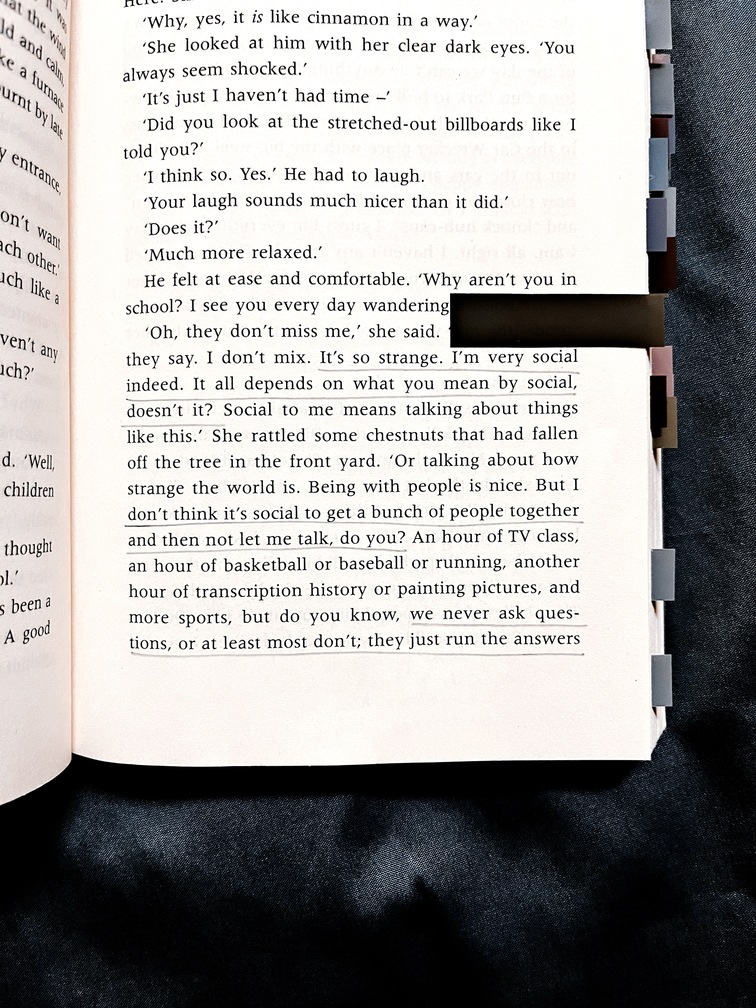
But my annotations kicked off only from page 41. The writing was too good from pages 41 to 43 that I couldn’t decide what I wanted to tab. I couldn’t hold back anymore, I really wanted to highlight lines. So I went and got a pencil. I flipped back to page 41 and underlined whatever called out to me as I reread those few pages.
I also went back to my previous tabs and underlined the specific lines that I wanted to remember. Yes, the tab was present, but I like to highlight the lines as well.
But they all say the same things and nobody says anything different from anyone else.
I’ve read classics before but none of them was this easy to read. They didn’t grip my attention or pose questions while building the world slowly. The author was also revealing new layers in the main characters on every page.
Montag is a fireman but not like the firemen we have now. In the futuristic world of the book, all buildings are fireproof and firemen aren’t needed anymore so they got a new job—to burn books. Every day, Montag burns books and finds satisfaction from the act. He lives a simple life and doesn’t question the way of his life.
When a new neighbour—a teenage girl—makes conversation with him and comments on how odd their society is, he is forced to think about it. At first, he is confused and laughs at her comments but soon, they are sharp like arrows. Even a five-minute conversation makes him think all night.
Although the girl is the start, other factors in his life push him to think and question further. I appreciated how it was clearly shown that although one event can be a catalyst, it is a series of events together that make a big enough impact for a person to question everything.
How can I leave myself alone? We need not to be let alone. We need to be really bothered once in a while, How long is it since you were really bothered? About something important, about something real?
The book is short but packs a ton. A big part of that is the author hitting hard truths one after another with no breaks. There are some great sentences about life before some about society and the world.
Once I started annotating with a pencil, I found myself picking it up often. And once I started annotating, I would annotate a ton in the next couple of pages. Once a really good monologue or scene starts, it doesn’t end quickly. It has a lot to say.
Several comments about the world in the book were eerie to read because they closely resemble where our world is heading. From comments about minorities and division to trends in education and jobs—they aren’t exactly where we are or will be but they look too similar.
Fahrenheit 451 was published in 1953 when the height of technology was the television. Smartphones, smartwatches, and much of what we have today weren’t easily possible then. The futuristic world in the book drew on the technology available then. In Montag’s house, there are televisions on 3 walls that speak personally to his wife and show people who become like “family” to her. His wife also constantly has earbuds playing music in her ears.
Through Montag’s wife, the book shows how we could lose ourselves in mindless content that keeps our minds busy without us having to do anything.
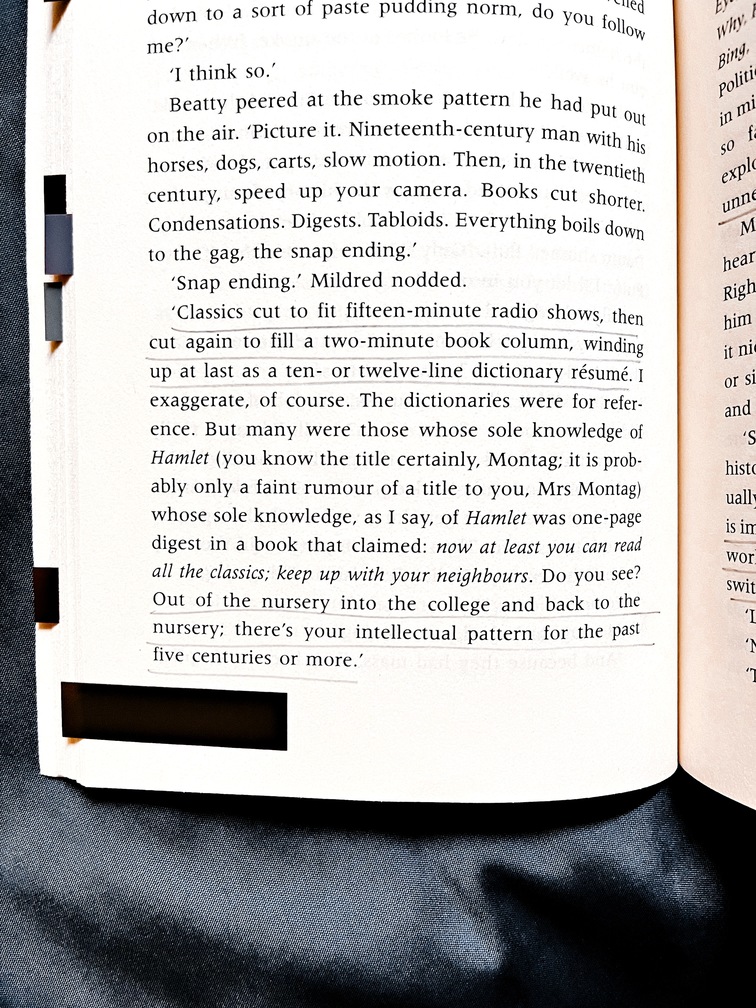
There were so many sentences that spoke to me and were blunt and true. I let myself annotate all that I wanted to and ended up making several marks on some pages. When simply underlining wasn’t enough or when I wanted to emphasize something differently, I circled them or used brackets. I wrote exclamations in the margins.
I’ve read a lot of books and make connections between the books that I’ve read often. Only once I started annotating freely did I realize just how many connections between books I’ve made. Because I annotate, I don’t discard thoughts so easily. If something is familiar, I ask myself why.
As I was reading this book, I was reminded of another book that I read years back. I couldn’t remember the exact name, though. I only remembered that the name started with G. So, I started writing on the page hoping that my brain will supply the book’s name to finish the sentence. It didn’t work.
I went on Goodreads to look for it. It was a book that I borrowed from a friend and read years back and I rated it high. I couldn’t find it on my GR shelf easily so I decided to search in my Goodreads Reading Challenge history. Since I read it years back, while in school, I decided that it must have been in 2017 or 2016.
And I was right! I found the book in my 2017 Reading Challenge history. It is The Giver by Lois Lowry.
We have everything we need to be happy, but we aren’t happy. Something’s missing.
I first annotated that this book reminded me of The Giver on page 58 and reiterated it on page 69. Both books feature a futuristic society where everyone is technically happy but they’re not given the freedom to choose and possibly be sad. In The Giver, the protagonist learns of secrets and how his society works as a “burden” that he is chosen to carry. In Fahrenheit 451, the protagonist is nudged and he does the rest of the questioning.
Despite reading The Giver several years back, I remember the story because it made a big impression on me. Reading Fahrenheit 451 was interesting because it was a similar story but from a very different point of view.
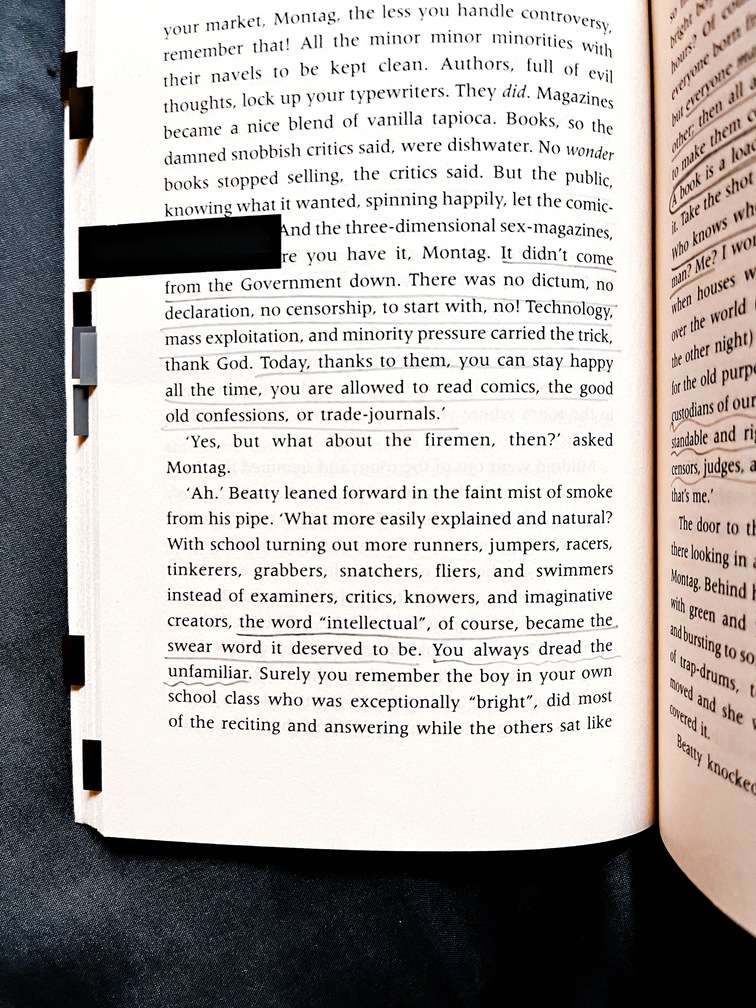
At the core of Fahrenheit 451 are books. Or rather, the absence of them. Montag burns books for a living and finds satisfaction in the activity but once he is forced to question his way of life, he questions his actions too. I absolutely loved the questions he posed and how he tried to find answers to them.
Although books are just one of the items that are removed from society, they signify everything. Books contain thoughts and force readers to think and the society in the book wants people to not think. The book’s world is built on people being crammed with information without being given any information that would make them think or question. Books—even the “harmless” fiction or middle-grade ones—have power. They provide alternate insights and spur conversation. Because they have the power to make waves, they are burned.
There must be something in books, things we can’t imagine, to make a woman stay in a burning house; there must be something there. You don’t stay for nothing.
Fahrenheit 451 shows the importance of books by envisioning a world where they are actively destroyed. Anything that can cause deep thought, arguments, or division is removed in order to maintain a “peaceful” community.
We take books for granted and as the song Let Her Go by Passenger says, we only know the importance of something when it is missing. There are several readers in our world but at times it feels like a majority of the population does not read for leisure. Among people I know in real life, there are only a few readers. Some of them are readers because I pushed them to read. I know too many people who responded with “I’ve never read an entire book for fun” when they learned that I’m an avid reader.
Although it is not a defining factor of people’s personalities, it is evident when a person is a reader and when they are not. The books they read clearly make a difference in their views, conversations, and openness.
Recently, I heard that an acquaintance is a reader and I could immediately guess what they read based on their personality. I asked about what they read and my guess was proven right.
I wouldn’t say that just because people consume other content—like movies, TV shows, and podcasts—they aren’t as open as readers. But I do see a difference. People who widely read are more likely to be able to converse about anything, be open to criticism and alternate perspectives, and less defensive.
Knowing the above, it was interesting to read about a world where people don’t read books. It is one person’s imagination based on what they noticed in the 1950s but it still holds good today. Fahrenheit 451 is truly a classic.
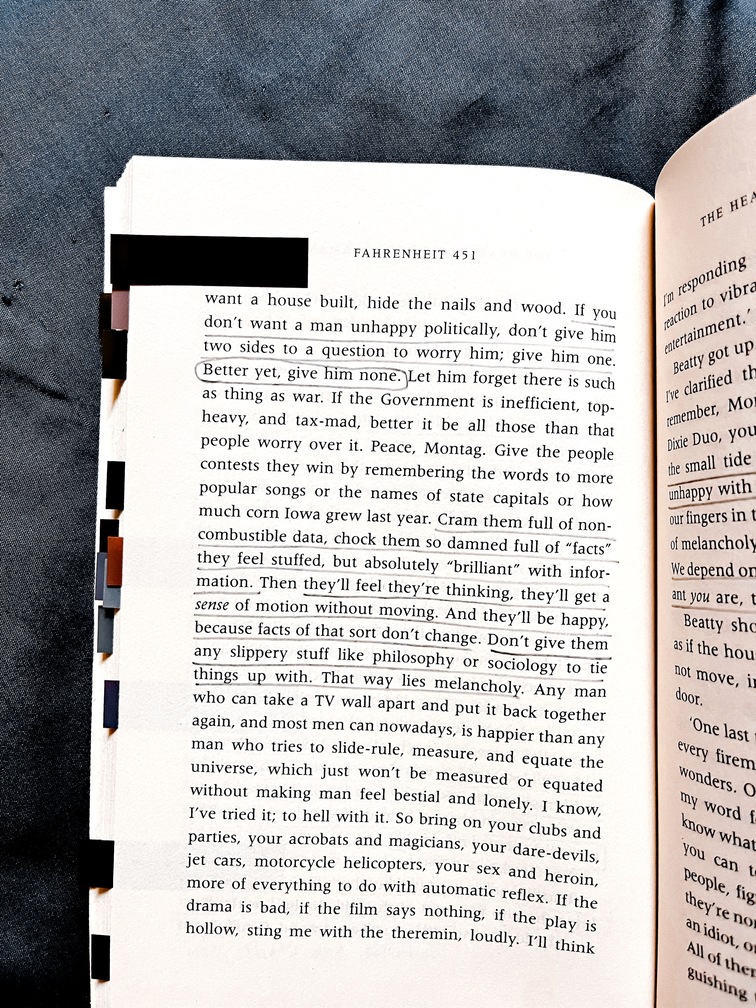
Coincidentally, a day after reading this book, Sulagna posted about another book that emphasises importance through absence. They reviewed If Cats Disappeared from the World by Genki Kawamura and asked what’s one thing that we cannot let disappear from the world. The post and question made me add the book to my to-read list.
We are constantly consuming content nowadays because of smartphones and social media. I consume content in many different ways from a variety of sources. Quite often, I come across things related to my current or recent reads which add to my reading experience. With Fahrenheit 451, it was Sulagna’s post.
As I was writing this post, Krutika posted on IG with the question “When and how did we ever lose our innocence and curiosity as we grew up?” and my answer drew on something Fahrenheit 451 said. (As I said before, books literally affect how we view things and interact in the world!)
Another time this happened was when I read If This Gets Out by Sophie Gonzales and Cale Dietrich and watched the Kdrama Her Private Life at the same time. Consuming those two related pieces of content added to my experience with them both and I actually considered writing a discussion post because I had so much to say. (But I think I went into a slump or something so I didn’t end up writing it.)
The basis of creativity is drawing connections between seemingly unrelated things. I want to read If Cats Disappeared from the World while Fahrenheit 451 is fresh on my mind because it might add to my current thoughts.
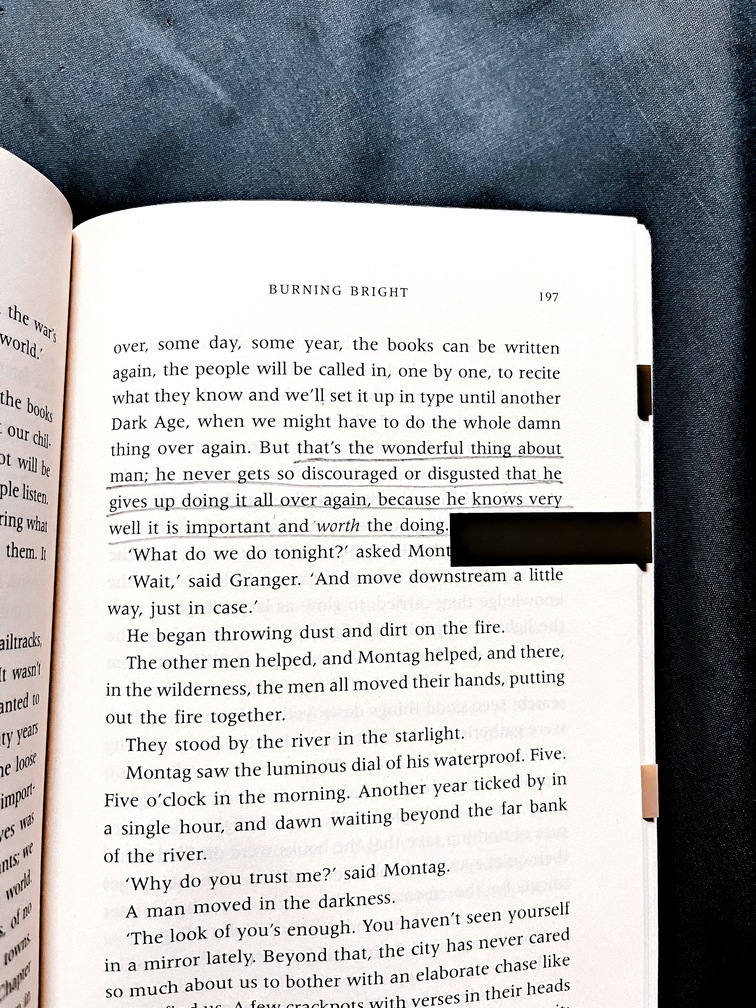
I read Fahrenheit 451 in half a day. I wanted to slow down and savour it, wanted to dissect parts and think about them longer, but I couldn’t stop myself from reading just a little bit more. Before I knew it, the book was done.
While the writing is easy to read, there are parts which are confusing because of the panic and dilemma the main character is going through. Sometimes, what he thinks doesn’t make sense and are metaphors. I could have read slowly to fully grasp them instead of moving on with whatever understanding I had at the moment.
Annotating forced me to slow down my reading and helped me understand a lot of the book. I could have read more slowly and taken breaks to ruminate over the chapters, though. I do want to reread the book sometime and do it slowly. There was so much to unpack from the quick read that I’m sure I would unpack even more if I gave each sentence enough attention.
In the last 40% of the book, my annotations were greatly reduced. I underlined less and tabbed very few pages. I was too absorbed in the story and didn’t want to pause to annotate. That is a sign of a good book but I wish I had read slowly and annotated more.
overall
If you can’t tell yet, I absolutely loved Fahrenheit 451 and I understand why it is widely praised.
It is a short book that is easy to read but will make you think. And books that make us think are the best ones because they stay with us during our days. I highly recommend it.
Everyone must leave something behind when he dies. [..] Something your hand touched some way so your soul has somewhere to go when you die. [..] It doesn’t matter what you do as long as you change something from the way it was before you touched it into something that’s like you after you take your hands away.
